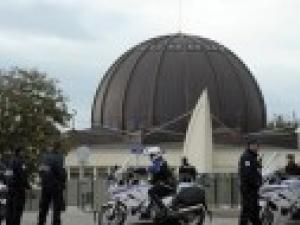Short Description
The Great Mosque of Strasbourg has become a mixing place for once-wary French to meet their Muslim neighbors.
Being an example of the tensions surrounding France’s growing Muslim minority, the Great Mosque of Strasbourg has become a mixing place for once-wary French to meet their Muslim neighbors.
“From the very beginning, we wanted to be open to the people around us,” Said Aalla, a Strasbourg jurist who is president of the mosque’s governing council, told The Washington Post.
With the capacity of 1,300sqm, it is 1.5 times as big as the previous largest one in France, at Evry in the Paris suburbs.
It has a 16m copper dome but no minaret and has taken nearly two decades to complete since the project was first launched in 1993.
Inaugurated last September, the mosque’s governing council wanted a bigger role for the mosque.
Built within 2km from Strasbourg’s celebrated cathedral, Notre Dame of Strasbourg, the mosque opened arms to thousands of tourists who began asking for directions at the Strasbourg Tourism Office.
More than 20,000 visitors inspected the construction site between July 2011 and July 2012.
In the four months since inauguration, 10,000 have taken guided tours of the finished building and the tempo of visits is accelerating, according to Aalla.
Abdelrahman Binjalloun, a Moroccan-born pharmacist who doubles as a guide, leads tourists across the mosque, answering their questions about Islam and Muslims.
A group escorted around the mosque on a recent day by Aalla and Binjalloun included about 35 alumni of a Roman Catholic engineering school, along with family members and several of the school’s Dominican professors in cream-colored friar’s robes.
“I have long been interested in the Muslim world,” said one of them, the Rev. Benoit Ente, who spent two years as an aid worker in heavily Muslim Chad.
“I was very interested to know what this mosque is like.”
For decades, Strasbourg was restricted to Roman Catholicism, Lutheranism, Calvinism and Judaism.
It was only in 1998 when the heads of the Roman Catholic Church, the Lutheran Church, the Calvinist Church and the Jewish minority signed a letter to the local government supporting the construction of a mosque.
They said Islam, the religion of a sizable community in the region, must enjoy comparable status with the four official religions.
Difficult Road
Becoming a symbol of religious understanding, the uneasy road to the mosque had survived a three-decade controversy between socialist and conservative administrations.
“The history of the Great Mosque was long, difficult and tortuous,” said Olivier Bitz, deputy mayor in charge of religious affairs in the Socialist-run Strasbourg City Council, headed by Mayor Roland Ries.
Inaugurated last September, the mosque came amid growing unease with the growing Muslim minority in France apparent in the passing of law banning full-face veil and growing opposition for right-wing political leaders to mosque projects in various cities.
After 15 years of fruitless meetings and conferences between Muslim figures and city officials, then-Mayor Catherine Trautmann in 1993 decided that the mosque would be built on a grand scale and that the city would help finance it, according to a 1905 legislation.
Her decision was opposed by conservatives, becoming a major campaign issue in the 1995 elections that brought her Socialist majority to power for another term.
As the conservatives captured City Hall in 2001 under then-Mayor Fabienne Keller according to Bitz, they were set out to bury the mosque.
“The entire project was put into question,” he said.
Keller’s mainstream right council nixed plans for a minaret, a cultural center and a tea salon.
It also shrank plans for the prayer hall by a third, forbade an underground parking lot and banned donations by foreign countries or sermons in Arabic.
Construction got off the ground only with the arrival in 2008 of another Socialist administration, this one under Ries.
Finishing the mosque, Ries has erased the restrictions asking Portoghesi to design an extension to embrace the originally planned cultural center, the tea salon and perhaps even a minaret.
France is home to a Muslim minority of six million, Europe’s largest.
French Muslims have been complaining of growing restrictions on their religious freedoms.






![نصيحتي لك: اذكر الله [1 / 12] نصيحتي لك: اذكر الله [1 / 12]](https://www.islamstory.com/images/upload/content_thumbs/1913613138ragheb-al-serjany-videos.jpg)


Comments
Send your comment